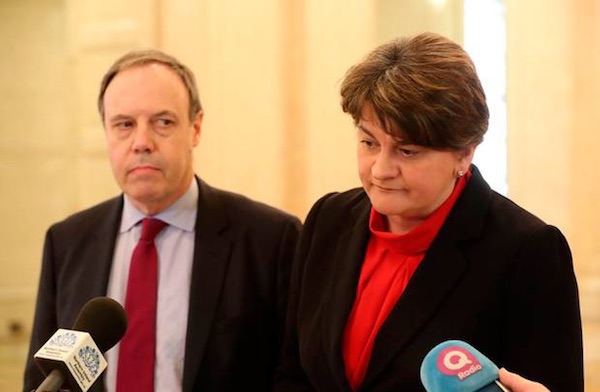
The current phase of political talks in Belfast has ended after unionist hardliners in the DUP rejected measures to increase recognition for the Irish language in the north of Ireland.
The latest crash in the political process came despite fresh enthusiasm earlier this week with the arrival into Belfast of the British Prime Minister Theresa May and the 26 County Taoiseach Leo Varadkar. The talks participants and the two governments had again sought to inject momentum into the efforts to restore power-sharing in the north of Ireland, which have now collapsed six times in the last thirteen months.
DUP leader Arlene Foster, whose party holds the balance of power at Westminster, today said there is “no prospect” of an agreement to restore power-sharing and admitted there are still “serious and significant differences” between her party and Sinn Fein. She called on her Tory colleagues to reassert full direct control over the north of Ireland.
The latest phase of the process began over three weeks ago and had been reported to be moving steadily towards a deal across a range of issues. However, Ms Foster has now described the negotiations as “unsuccessful”. She said the DUP and Sinn Fein had been unable to reach agreement on a long-delayed promised Irish Language Act, which would have enshrined the rights of Irish langage speakers in law.
The 2006 St Andrews Agreements included an Irish Language Act to give legal status to Irish, which should have paved the way for greater use of Irish on street signs and in public bodies. However, that legislation was frustrated when the DUP repeatedly blocked it at the Stormont Assembly in Belfast.
The current crisis began in January 2017 with the resignation of Sinn Fein’s late Deputy First Minster at Stormont, Martin McGuinness. He quit in response to still unresolved allegations of corruption against Ms Foster and her party. The integrity of the political institutions set up under the peace process were then called into question, as well as the DUP’s commitment to the implementation of equality and civil rights measures, including an Irish Language Act.
There had been high hopes in certain circles that a deal to include an Irish Language Act could be reached this week. Monday saw a familiar high-profile effort to recreate the ‘hothouse atmosphere’ and ‘media circus’ beloved by the two governments and main television networks.
Speaking in Belfast, Theresa May urged the North’s political leaders to make “one final push”. With public pressure building for a resolution, Sinn Fein MP Conor Murphy urged the “DUP need to make up their mind up about whether they are up for a deal or not”.
However, Arlene Foster yesterday condemned the involvement of the British Prime Minister as a “distraction” and this evening, the DUP’s powerful ‘backwoodsmen’ were again claiming credit for vetoing a measure they fear could increase the visibility of the Irish language in their areas.
Ms Foster said: “Despite our best efforts, serious and significant gaps remain between ourselves and Sinn Fein especially on the issue of the Irish language.
“I have made it consistently clear that unionists will not countenance a stand-alone or free standing Irish Language Act. Sinn Fein’s insistence on a stand-alone Irish Language Act means that we have reached an impasse.”
She called for all powers of government in the north of Ireland to be returned to London.
“It is now incumbent upon Her Majesty’s Government to set a budget and start making policy decisions about our schools, hospitals and infrastructure,” she said. “Important decisions impacting on everyone in Northern Ireland have been sitting in limbo for too long.”
In a brief statement to the media, the British Direct Ruler in Ireland, Karen Bradley, claimed “a basis for accommodation still exists”.
In a tweet, the 26 County Foreign Minister said he was “very disappointed” by the DUP statement. “NI needs a Govt,” he said. “As co-guarantors of Good Friday Agreement, the UK and Irish governments have an obligation to uphold and protect the letter and spirit of that Agreement. We will need to reflect in the coming days on how best to do that.”
In a statement this evening, Sinn Fein’s new Deputy Leader, Michelle O’Neill, said:
“Sinn Fein over the past 13 months worked to restore the institutions on the basis of respect, integrity and equality for all sections of society.
“When this latest round of talks was announced in January, I said a short, sharp and focused negotiation was required to resolve the outstanding issues of rights and equality available everywhere else in the islands.
“Sinn Fein engaged, we worked in good faith, we stretched ourselves. We had reached an accommodation with the leadership of the DUP. The DUP failed to close the deal. They have now collapsed this process.
“These issues are not going away. Sinn Fein are now in contact with both governments and we will set out our considered position tomorrow. The DUP should reflect on their position.”
![[Irish Republican News]](https://republican-news.org/graphics/title_gifs/rn.gif)
![[Irish Republican News]](https://republican-news.org/graphics/title_gifs/harp.gif)

